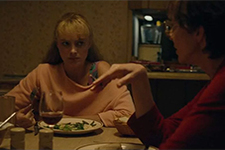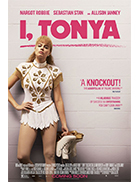I, Tonya
|  The biggest problem with I, Tonya, Craig Gillespie’s highly entertaining, bitter-black-comic take on the infamous ’90s American ice skater Tonya Harding, is the title, which seems to suggest that the entire film is told from Tonya’s perspective. But, quite the opposite is true. The screenplay by Steven Rogers (Love the Coopers, Kate & Leopold) allows for almost all the major participants in the wretched events leading up to the whacking of Nancy Kerrigan’s knee to have their say—except, interestingly enough, Kerrigan, who remains a kind of shadow figure throughout the film, perhaps as a means of drawing more attention to the aspects of Harding’s life that were overshadowed by that tabloid-ready debacle. However, we do get to hear directly from Tonya (Margot Robbie), her abusive mother LaVona (Allison Janney), her ex-husband Jeff Gillooly (Sebastian Stan), who masterminded the attack, Shawn Eckhart (Paul Walter Hauser), the self-described “body guard” who actually set the attack in motion, and a fictional Hard Copy reporter played by Bobby Cannavale just to re-emphasize the sensationalist sleaze of it all. Although Tonya is the first character we see on-screen, the others get their documentary-style-interview introductions first, which essentially sets her up as a kind of pawn, a figure who is defined differently according to who is talking. The films opens with the disclaimer that it is “Based on irony-free, wildly contradictory, totally true interviews,” which may or may not be true. What that disclaimer does rightly address, though, is the idea that absolute “truth” in the depiction of any event, much less one that was ground into such tabloid fodder, is very much impossible to capture, so it’s best to just admit up front to the contradictions and let them play out. Thus, even though I, Tonya dramatically (and comically) recreates events from the past, the filmmakers put the “contradictory” elements up front by sometimes setting various recreations in stark opposition to the narration and also allowing the characters to break the fourth wall at times and address the audience directly regarding the veracity of the event in which they’re currently embroiled. The film moves in strictly chronological fashion, alternating widescreen recreations of events with squarish faux-documentary video of the participants recalling those events in some unspecified time years later. We open with Tonya as a precocious child skater whose draconian monster of a mother (whose first major scene is scored with Cliff Richard’s “Devil Woman”) literally forces her onto a young skating instructor (Julianne Nicholson) who will go on to be her coach. Immediately we are introduced to the fundamental conflict in Tonya’s desire to be a world-renowned skater: social class. Growing up a poor, self-described “redneck” in Portland, Oregon, Tonya’s look, demeanor, and style did not fit with the upper-crust expectations of the haughty world of figure skating. Although she routinely bested the other skaters on the ice with her skill and became the first U.S. skater to land the fabled triple axel, she nevertheless consistently failed to score at the top due to the judges’ bias against her homemade costumes, overabundance of puffy-sprayed bangs, and penchant for choosing hard rock over classical music. By the time she is a teenager played by Margot Robbie, Tonya has already begun to feel the crush of her social class, embodied most prominently by her emotionally (and at times physically) abusive mother. LaVona, who Allison Janney brilliantly plays as a damaged soul so hardened by life that she is incapable of finding joy in anything, stands as both Tonya’s biggest supporter and also the frightening reminder of where she will end up (waiting tables and slowly killing herself with booze and an endless chain of cigarettes) if she can’t make her skating dreams come true. Tonya is both embarrassed and emboldened by her background, a clash that she internalizes in ways that she can never fully manage. Somewhere in there she gets involved with Jeff Gillooly (Sebastian Stan), who at first seems shy and decent, but turns out to have a short fuse and a hard slap. Jumping from one abusive relationship to the next, Tonya marries Jeff young, partially to get away from LaVona, but ends up setting in motion the series of events that would make her one of the most despised figures in contemporary American culture. Although he was her ex-husband at the time, Jeff was the primary instigator in the series of decisions that eventuated in Nancy Kerrigan’s knee getting whacked and Tonya Harding’s skating career coming to a disastrous end at the moment she was primed to ascend to its peak. The plan originally involved sending Kerrigan threatening letters, which the film shows that Tonya was aware of, but it slowly morphed into something more directly violent, a change of which Harding was apparently unaware. Thus, I, Tonya casts its namesake primarily as a tragic victim, first of the limits of her social class and then by a tabloid feeding frenzy that cast her as the villain of a devious plot that violated every virtue associated with athletic competition, made all the more deliriously surreal by its association with the prim, respectable art of figure skating. Tonya was cast as the trashy defiler of something previously understood as pure, and her lifelong punishment was not just banishment from the sport she loved, but being permanently reduced to a caricature. And, on some level, I, Tonya indulges in that caricature, as Margot Robbie’s performance trades heavily on Tonya’s lack of sophistication, gutter language, and seething anger. Yet, at the same time, Rogers’s screenplay persistently humanizes her against our tendency to see her as a one-dimensional pop-culture punchline, allowing us into her troubled world and conveying in no uncertain terms that she was a product of constant abuse, both interpersonally by her mother and husband, but also symbolically by the snobbish world of figure skating and the larger American culture that so easily demonized her for their own pleasure. “I’m a person,” Tonya says in her first interview segment, something the film constantly strives to convey even as it finds and mines and rich vein of dark black humor from the events that eventually consumed her. Director Craig Gillespie (Lars and the Real Girl, Fright Night) has played with discordant tones and wince-inducing humor in his previous films, and I, Tonya suits him quite well, delivering a you-wouldn’t-believe-it-if-it-weren’t-true saga of crime and punishment in the tabloid era. That he delivers as many laughs as does insight into such a unique tragedy of errors is testament to his deft balancing act and willingness to not ignore, but engage the contradictions. Copyright © 2017 James Kendrick Thoughts? E-mail James Kendrick All images copyright © 30West |
Overall Rating: 


 (3.5)
(3.5)


